Síncope Hipóxico de la apnea en inmersión 🇪🇸 🇬🇧
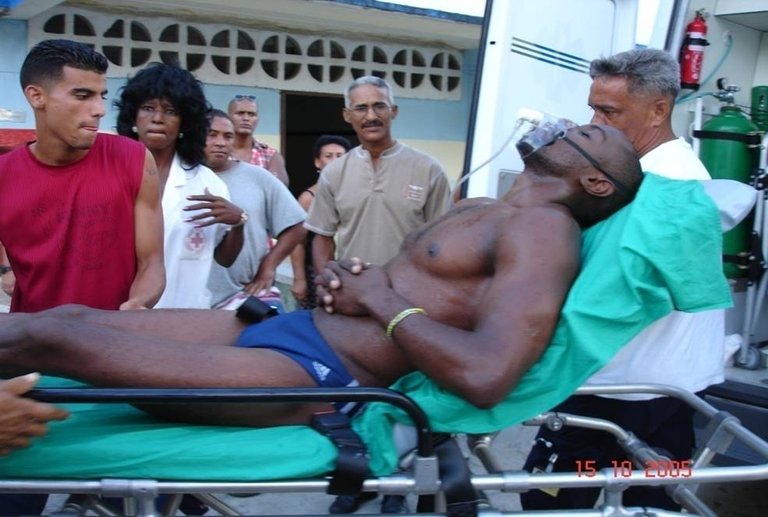
También conocido como Blackout, el Síncope Hipóxico de la apnea en inmersión, es una realidad frecuente que cada año cobra la vida de muchas personas que realizan caza submarina, deportistas de la apnea, y personas que les gusta ir al mar u otro medio líquido, para nadar bajo del agua y ver qué distancia pueden alcanzar reteniendo su respiración de manera voluntaria.
¿Qué es el Blackout?
El Blackout lo podemos definir como la brusca pérdida de la conciencia, que ocurre generalmente durante el ascenso del buzo a la superficie o próximo a ella, tras una inmersión prolongada de su apnea.
A nivel deportivo en piscina, es frecuente que ocurra en la modalidad de apnea dinámica sin aletas o con aletas; en el mar cuando se hace Jump Blue y en otras modalidades de descenso vertical en el azul.
Antes de la pérdida de conciencia, le precede una fase de hipoxemia, conocida en entre los amantes de la apnea con el nombre de Samba. Se caracteriza por una alteración del control neuromotor, movimientos involuntarios y visión borrosa. La persona se mueve de un modo desordenado. Si es asistido, muestra reacciones defensivas ante los presentes. Casi nunca recuerda lo que le pasa.
¿Por qué se produce el Blackout?
Ocurre cuando el buzo en inmersión retiene el tiempo de apnea por encima de su capacidad fisiológica. No respeta las señales del cuerpo que indican que tiene que reanudar la respiración, y que ocurre cuando el dióxido de carbono (CO2) se eleva en sangre.
Mientras sigue prolongando su tiempo de apnea. La presión parcial de oxígeno (PaO2) va disminuyendo por su consumo, y al llegar a cifras entre 0.15 y 0.10 atmósferas absolutas (ATA), pierde súbitamente la conciencia.
El Blackout puede ocurrir también durante la apnea estática o en un cazador submarino que esté en el fondo, donde puede incluso agregarse otra patología disbárica.
Representación gráfica la fisiopatología en un descenso a profundidad:
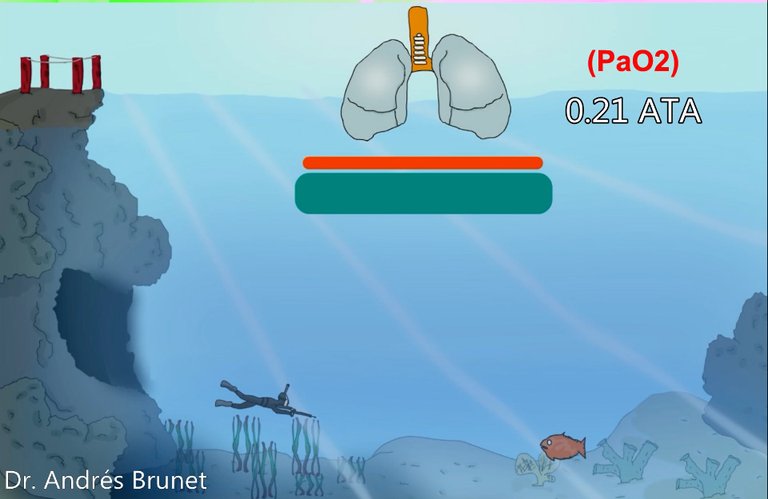
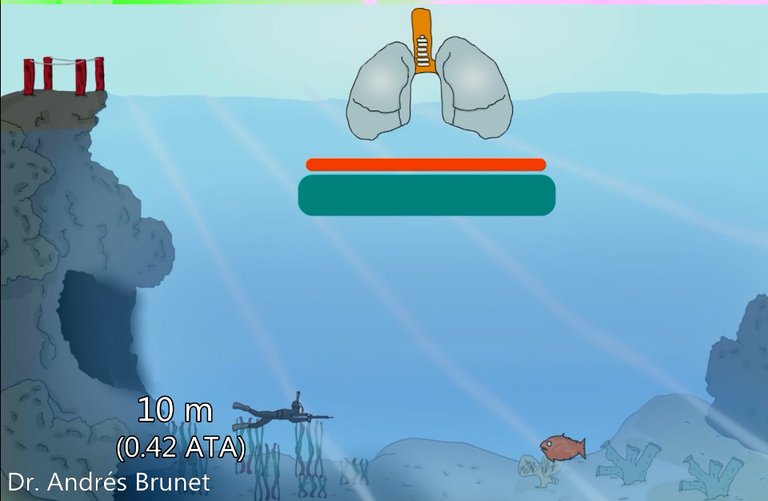
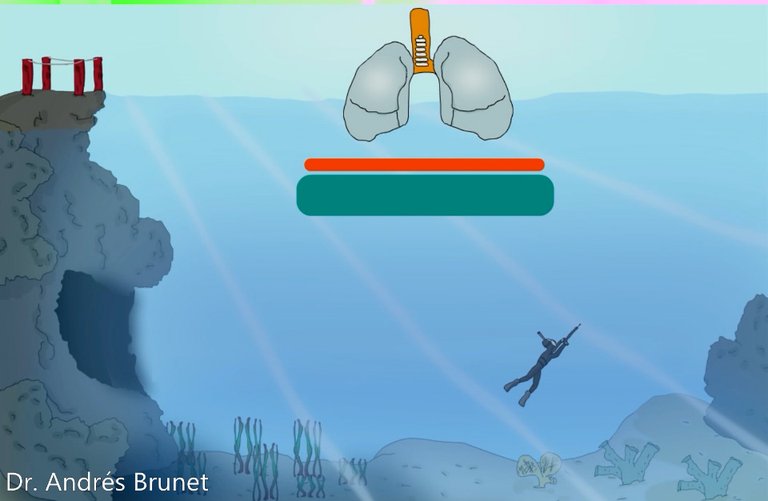
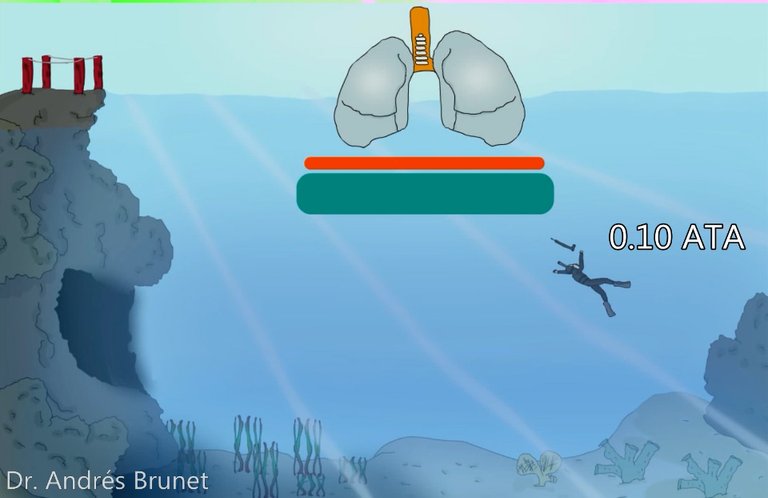
Blackout en piscina
Son imágenes de capturas de pantalla de un video. El deportista realizaba su competencia de apnea dinámica sin aletas, y al llegar al borde de la piscina perdió el conocimiento. Mi equipo médico lo asistió a la mayor brevedad.
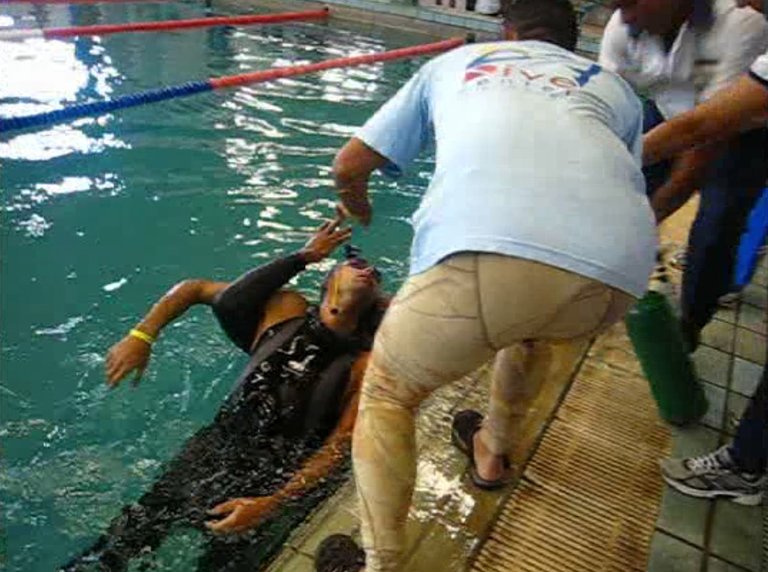
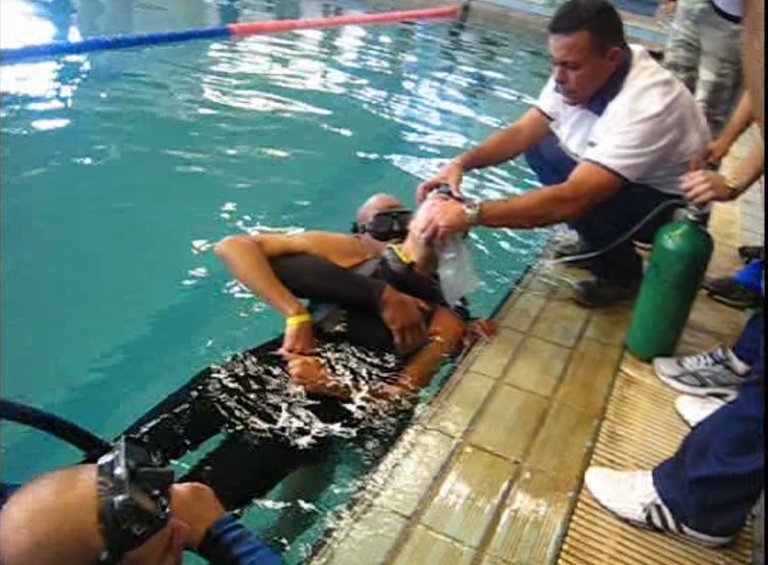
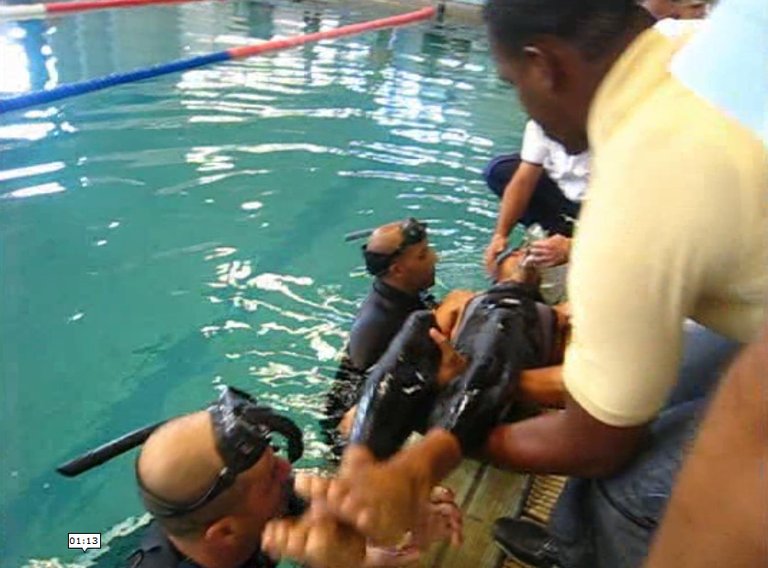
Blackout en el mar
Esto aconteció en la modalidad de Jump Blue. El apneísta va haciendo su recorrido próximo a la cuerda. Cuando ya estaba con hipoxemia franca, fue perdiendo el control y su flotabilidad. Pueden ver cómo Deborah lo asistió para llevarlo a la superficie, junto a otros buzos aseguradores que se sumaron para ayudarla.
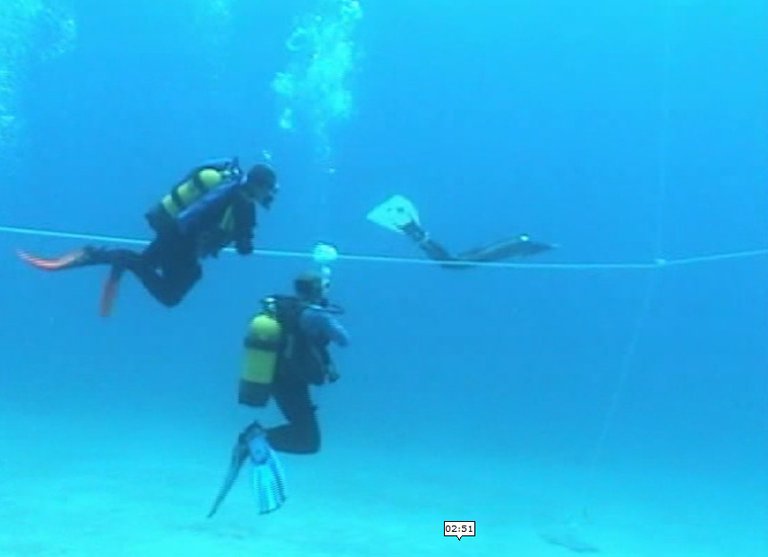
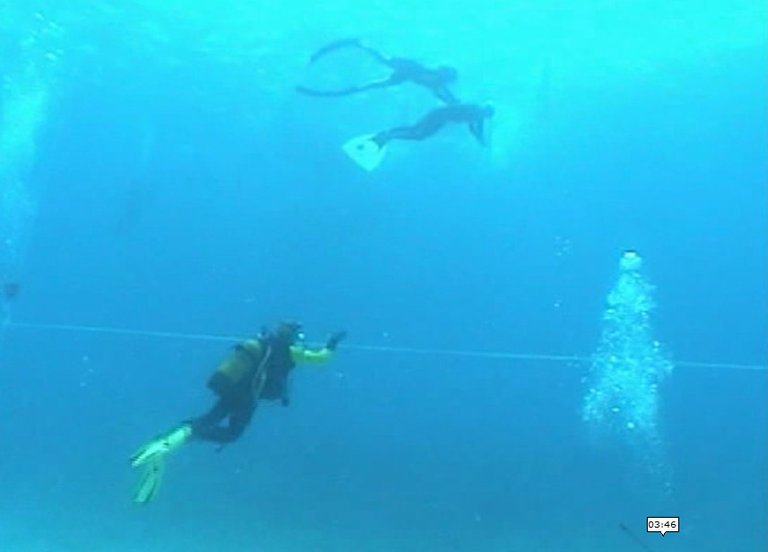
¿Cómo podemos prevenir un Blackout?
Tener sentido común. Se debe estar entrenado físicamente, pero sobre todo, estar equilibrado a nivel psicológico.
Si estás indispuesto, tanto físico como mentalmente, no te lances a realizar una apnea.
No hacerlo en ayunas, ni acabados de comer. La hipoglicemia, y el consumo de oxígeno y energía que causa la digestión, predisponen a este accidente.
Evita el estrés y la ansiedad: producen respiraciones superficiales frecuentes, y tu aporte de oxígeno será menor.
Hidrata tu cuerpo. En el agua se pierde líquido por sudoración y por la orina. Toma agua y así evitas la deshidratación celular.
Seguir la regla de oro del buceo. Nunca bucear o pescar en solitario. Una persona capacitada debe acompañarnos para asistirnos si es necesario.
Evita las hiperventilaciones excesivas. Ellas causan una disminución de la concentración del CO2 en sangre, con una inhibición relativa del centro respiratorio.
No realices esfuerzos físicos durante el descenso, en el fondo y durante el ascenso, para evitar el consumo del gas vital.
Evita la hipotermia que afecta la integridad del sistema nervioso. Usa medios de protección de acuerdo con la temperatura del agua y las condiciones reales del buceo.
Evita lastrarte en exceso. No dudes en desprenderte del cinturón de plomos ante situaciones que lo ameriten.
¿Cuál es su pronóstico?
Dependerá de las condiciones en que se encuentre el individuo en el momento del síncope. Si se encuentra solo, sin nadie que perciba su accidente, suele ser fatal, muriendo por un ahogamiento. Si es asistido, sin otro tipo de complicaciones y se realiza la actuación antes descrita, no tendrá peligro para su vida y su recuperación es rápida.
¿Qué debemos hacer ante un Blackout?
Extraer a la persona del medio acuático, manteniendo la flotabilidad y la cabeza fuera del agua. Si un acompañante visualiza el síncope en plena inmersión, subirlo a superficie, tapándole las vías aéreas y con la cabeza en extensión.
Una vez en superficie, retirar los espejuelos o la careta. Acostar al lesionado boca arriba y elevar sus piernas. Lo ideal es administrar Oxígeno Medicinal Normobárico a flujo continuo al 100 %.
Si no tenemos el cilindro de oxígeno, insuflar aire en sus vías aéreas hasta su recuperación o aplicar maniobras de Soporte Vital Básico sin demora.
Bueno amigos, espero que les haya sido de utilidad este post. Gracias por leerme.
Hypoxic syncope of apnea in immersion

Also known as Blackout, Diving Apnea Hypoxic Syncope, is a frequent reality that every year claims the lives of many underwater hunters, apnea athletes, and people who like to go to the sea or other liquid medium, to swim underwater and see how far they can reach by holding their breath voluntarily.
What is Blackout?
Blackout can be defined as a sudden loss of consciousness, usually occurring during or near the diver's ascent to the surface after a prolonged free dive.
At a sporting level in the swimming pool, it frequently occurs in the dynamic apnea modality without fins or with fins; in the sea when doing Jump Blue and in other modalities of vertical descent in the blue.
Before the loss of consciousness, it is preceded by a phase of hypoxemia, known among apnea lovers as Samba. It is characterized by impaired neuromotor control, involuntary movements and blurred vision. The person moves in a disordered manner. If assisted, shows defensive reactions to those present. He almost never remembers what is happening to him.
Why does Blackout occur?
It occurs when the diver in immersion maintains the apnea time above his physiological capacity. It does not respect the body's signals to resume breathing, which occurs when carbon dioxide (CO2) increases in the blood.
While continuing to prolong the apnea time. The partial pressure of oxygen (PaO2) is decreasing due to its consumption, and when reaching figures between 0.15 and 0.10 atmospheres absolute (ATA), he suddenly loses consciousness.
Fainting may also occur during static apnea or bottom spearfishing, where other dysbaric pathology may be added.
Graphical representation of the pathophysiology during a descent to depth:




Blackout in swimming pool
These are images of screenshots from a video. The athlete was performing his dynamic apnea without fins competition, and when he reached the edge of the pool, he lost consciousness. My medical team assisted him as soon as possible.



Blackout at sea
This happened in the Jump Blue mode. The freediver is making his way close to the rope. When he was already with frank hypoxemia, he was losing control and his buoyancy. You can see how Deborah assisted him to bring him to the surface, together with other divers who joined in to help her.


How can we prevent a Blackout?
Have common sense. You must be physically trained, but above all, you must be psychologically balanced.
If you are unwell, both physically and mentally, do not start a free dive.
Do not do it on an empty stomach, nor after eating. Hypoglycemia, and the consumption of oxygen and energy caused by digestion, predispose to this accident.
Avoid stress and anxiety: they produce frequent shallow breathing, and your oxygen supply will be lower.
Hydrate your body. In water, liquid is lost through sweating and urine. Drink water to avoid cellular dehydration.
Follow the golden rule of diving. Never dive or fish alone. A trained person should accompany you to assist you if necessary.
Avoid excessive hyperventilations. They cause a decrease in the concentration of CO2 in the blood, with a relative inhibition of the respiratory center.
Do not make physical efforts during the descent, at the bottom and during the ascent, to avoid the consumption of vital gas.
Avoid hypothermia, which affects the integrity of the nervous system. Use protective gear according to water temperature and actual diving conditions.
Avoid excessive weighting. Do not hesitate to remove your weight belt in situations that warrant it.
What is your prognosis?
It will depend on the conditions in which the individual is at the time of syncope. If he is alone, with no one noticing the accident, it is usually fatal, with death due to drowning. If he is assisted, without other complications and the action described above is carried out, he will not be in danger for his life and his recovery is fast.
What should we do in the event of a blackout?
Remove the person from the aquatic environment, maintaining buoyancy and keeping the head out of the water. If a buddy sees the syncope in the middle of the dive, bring him to the surface, covering the airway and with the head in extension.
Once on the surface, remove the goggles or mask. Lay the injured person on his back and elevate his legs. Ideally, administer Normobaric Medical Oxygen at 100% continuous flow.
If we do not have the oxygen cylinder, insufflate air into the airway until recovery or apply Basic Life Support maneuvers without delay.
Well friends, I hope you found this post useful. Thanks for reading.

Separador. De uso libre por/Text divider. Free use from @eve66
Texto por/Text by Andrés Brunet
Capturas tomadas de un video: Archivos de nuestra Federación/Screenshots taken from a video: Archives of our Federation.
Foto inicial propia. Cámara/Own initial photo. Camera: Sony DSC-HX20V
Gracias por leer/Thank you for reading
Bienvenidos sus comentarios/Welcome your comments
¡Saludos infinitos!/Infinite greetings!
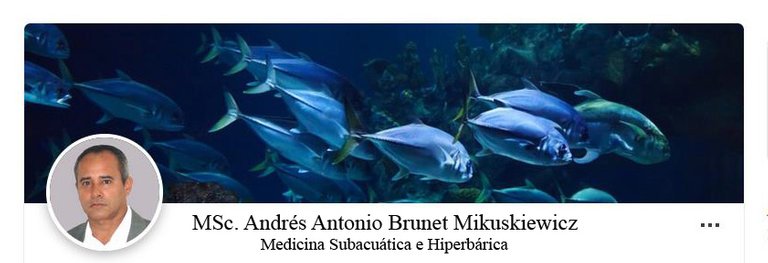
Un trabajo muy completo y didáctico, estimado amigo. Si bien, no somos especialista en la materia, nos encanta aprender, con sus presentaciones.
Notamos baja interacción en su post y es, quizás, por lo técnico del título del mismo; tal vez colocando Blackout, llamaría más la atención.
Gracias por traer, contenidos de calidad, al feed de la comunidad.
Saludos.
Gracias amigos por sus palabras. Es un tema que debe conocerse bien, ya que es el accidente que más vidas cobra cada año en el buceo en apnea.
Pienso que la baja interacción quizá se deba a que me referí a una patología médica frecuente en este deporte. Cierto, usé el nombre médico adecuado, no el nombre popular, pero la foto inicial puede despertar la atención de las personas. Quizá alguno lea, pero no comente; eso pasa a veces en cuestiones médicas.
Es un accidente, que se puede evitar si sabes cómo prevenirlo, por eso es un tema que me encargo de difundirlo.
Le deseo un buen inicio de semana. Saludos
Muchas gracias, amigo, por sumar valor a la blockchain de Hive.
Saludos.
A very interesting post, well structured and illustrated... Valuable and relevant information... Excellent work. Thanks for sharing @abrunet friend!
!discovery 30
!VSC
@jlinaresp has sent VSC to @abrunet
This post was rewarded with 0.1 VSC to support your work.
Join our photography communityVisual Shots
Check here to view or trade VSC Tokens
Be part of our Curation Trail
@jlinaresp ha enviado VSC a @abrunet
Éste post fue recompensado con 0.1 VSC para apoyar tu trabajo.
Únete a nuestra comunidad de fotografía Visual Shots
Consulte aquí para ver o intercambiar VSC Tokens
Se parte de nuestro Trail de Curación
Hi @jlinaresp, thanks for appreciating the value of the post. Your words are always encouraging to any content creator. As we say in medicine: you have a good clinical eye. My regards
This post was shared and voted inside the discord by the curators team of discovery-it
Join our Community and follow our Curation Trail
Discovery-it is also a Witness, vote for us here
Delegate to us for passive income. Check our 80% fee-back Program
Congratulations @abrunet! You have completed the following achievement on the Hive blockchain And have been rewarded with New badge(s)
Your next target is to reach 800 replies.
You can view your badges on your board and compare yourself to others in the Ranking
If you no longer want to receive notifications, reply to this comment with the word
STOPCheck out our last posts:
¡Excelente trabajo y muy bien documentado! ¡Felicitaciones!
Gracias @ylich por sus palabras. Siempre son de aliento para todos. Mis saludos
¡Felicidades! Esta publicación obtuvo upvote y fue compartido por @la-colmena, un proyecto de Curación Manual para la comunidad hispana de Hive que cuenta con el respaldo de @curie.
Si te gusta el trabajo que hacemos, te invitamos a darle tu voto a este comentario y a votar como testigo por La Colmena.
Si quieres saber más sobre nuestro proyecto, te invitamos a acompañarnos en nuestro servidor de Discord.
Estas personas se juegan la vida por el deporte, se requiere mucha preparación y entrenamiento en esta actividad de valientes. Muy completa la información y excelente contenido, sigo aprendiendo cosas nuevas. Saludos
Hola, todo deporte tiene sus riesgos. Pero cuando se hace en un medio distinto al nuestro, los riesgos son diferenciados y toda precaución es poca. Gracias por escribir y es bueno saber que mis post te aportan algo. Saludos